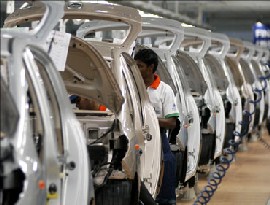Amid a slowdown in the automotive industry, the Automotive Component Manufacturers Association of India asked the government to continue providing export incentives to domestic manufacturers, while expressing concern over India's growing number of free trade agreements.
 "The automotive market has seen slowing down of growth in the current fiscal year and a veil of uncertainty prevails across global markets. In this environment, we would request the government to continue with exports incentives so that growth in the industry is sustained," ACMA President Srivats Ram said in New Delhi.
"The automotive market has seen slowing down of growth in the current fiscal year and a veil of uncertainty prevails across global markets. In this environment, we would request the government to continue with exports incentives so that growth in the industry is sustained," ACMA President Srivats Ram said in New Delhi.
The Duty Entitlement Pass Book (DEPB), a popular tax benefit scheme for exporters, is scheduled to end on September 30, 2011.
However, the exporting community is pressing hard for its continuation. The automotive sector is one of the biggest beneficiaries of the 14-year-old scheme, which has been extended many times by the Finance Ministry on the recommendation of the Commerce Ministry since 1997.
Under the scheme, exporters get a refund of duties on the import content of their export products, but it costs the exchequer about Rs 8,000 crore (Rs 80 billion)
per annum.
Addressing the 51st annual session of ACMA, Ram said high inflation, fuel and interest rate hikes have slowed down the growth of the automotive market in recent times.
"We are concerned about the effect of the second year of high inflation on our competitiveness, given slow growth...," he added.
Commenting on the various free trade agreements (FTAs) signed by India with many countries -- with yet another pact with the European Union (EU) on the horizon - Ram said, "We are increasingly concerned about the FTAs the government of India is looking at..."
In this regard, he said the government needs to ensure that core manufacturing remains in the country.
After signing FTAs with Thailand, South Korea and Japan, India is currently negotiating another with the EU, which has been demanding reduced duty on fully imported cars and components.
Currently, the import duty on a fully imported car is around 60 per cent, while it ranges from 10 per cent to 30 per cent in the case of components.
